Webinars have become the new sales strategy for many good and bad business people to get clients and customers, but MANY of them in my experience have turned out to be scams. And here’s how:
Many of these webinars promise to “reveal” certain things, generally related to:
- Making a lot of money (It’ll be the main topic of this article since my site deals with making money online).
- “Revealing” some sort of health related breakthrough “Secrets”.
- “Revealing” some “secrets” to things like succeeding with love.
- “Revealing” the “secret” to whatever subject you are having a problem with and want a solution to.
And “all you had to do” was just watch this webinar. But by the end of it:
It would turn out to be nothing more than a sales pitch for you to buy something very, very expensive (a high ticket program for instance).
And what’s even WORSE is that when you look back at that same webinar you watched, you feel like you actually got nothing out of it. In other words:
1) No real secrets were revealed.
2) No actionable strategy was revealed on how to make money, get better health or attain better results in “list your subject of interest here”.
3) Basically, you feel like you were only sold a lot of hype, just to get you to pay a lot of money.
4) In short, you feel like you were lied to.
Well there’s a good reason you feel this way and it’s the same reason why you found this article: It’s because you probably experienced what is known as a webinar scam.
I’m going to show you how to avoid these things and identify which ones are legitimate.
The truth is, many good and bad ones play out the same way initially, but it’s their value and what they pitch to you on the back end of the webinar that determines if it is a scam or not (and I’ll show you how to figure this out).
Everything you need to know about spotting webinar scams explained:
Some quick info about myself before we move on:
Now I do list my 2020 and 2021 profits too if you’re wondering.
But anyway, if you’re just looking for info on webinars and other subjects, that’s totally fine too. Let’s get to that subject:
Here’s what a webinar scam might look like:
How people usually find webinar scams (And why they don’t even know it):
The truth is, webinars and the people who make them find you via many different marketing methods:
- Online ads through places like YouTube, Google, Facebook, ect…
- They also email their subscribers and then have their subscribers email you.
- In short, whatever subject of interest you have that has the potential to make someone money, will usually have some sort of marketer make ads to find you.
For example:
You look up a video on YouTube related to say making money online.
Before you know it, you’ll have ads from “success stories” and their ads popping up for other videos you watch saying they have the “secret” to making money online and that their “exclusive webinar” is going to “reveal that” if you join for a “limited time”. And I’m quoting many of these words because they’re nonsense.
And also as soon as you visit the webinar page and sign up, congratulations. Your IP address has also been saved and if you’re on Facebook, you’ll also see similar ads for it there. It’s crazy how this marketing can spread like a virus and I know all of this because I do internet marketing.
Anyway, if you take out the make money online example and insert something like dating, finding the cure to a certain health condition, you can also bet there will be similar ads and webinar pitches coming your way.
But once you sign up for this “amazing, exclusive, one time webinar”, here’s how it usually plays out:
Let’s say the webinar you signed up to watch is related to making money online:
1) You get a bio about the creator of the webinar:
In the beginning, they (whoever made it) will tell you about how much money they’ll teach you to make.
2) The history of the webinar creator is explained:
In the middle, they will tell you about their history about how they went from being broke to rich (while still pointing out those bullet points on how much you can make if you follow their system).
3) This is usually the part of the webinar with a little actual value.
Towards the latter end of the webinar is when you MAY be lucky enough to get SOME valuable information on what you originally even signed up to see. So if it was about making money online, you might get a VAGUE strategy example here.
If you signed up for dating, you may get a little bit of an example of what to do.
If it’s about health, you may get a one mention of a product that’s good, or several (if you’re lucky).
But even if there is a little bit of value at this stage of the webinar, the thing is, there’s a catch:
They will also typically follow up by telling you that if you want the full benefits of (making money online or whatever subject you’re watching the webinar on), they’ve got something “special for you”:
4) BAM, this is where the webinar pitches the offer:
Hype is how a typical webinar starts. But it’s always meant to excite you for the offer and it’s towards the end stages of the webinar is when it’s finally pitched.
And it’s pitched in a way to make you think the offer is:
- So amazing.
- So exclusive.
- So timely limited.
- And that you get so many bonuses and value.
That in short, if you don’t go for that offer, it will “never show up again” and you’d be crazy not to “act now”.
With make money online type webinars, when they follow this particular order, eventually people are led into high ticket programs, which typically are for most part scams.
In short, when you attribute a value to the webinar you saw, here’s how it usually looks:
A special note on webinar scams involving MLM programs:
What I just explained about regular webinars playing out is also common stuff that takes place in the MLM world as well.
You will be given a link to access some sort of “special presentation” very often instead of having a single person talk about their success, you’ll get a pitch about an opportunity, success stories, and then the pitch to what is commonly an MLM scheme. Beware of those too!
A personal story about this MLM webinar nonsense I experienced:
Literally just yesterday (4/13/20), my cousin’s friend contacted me because his friend heard I do online marketing. He told me wanted to talk business and I recall this friend (we met before) being a cool dude so I said it was cool if my cousin gave me his number.
10 minutes later, I get the call and wouldn’t you know it, the friend is pitching me an “opportunity” and doesn’t have too much time to tell me about it, but has a special link he has for me with a 20 minute webinar presentation.
I already knew well ahead of time what this nonsense was about so I told him I know what it is and I’m not interested. Now I know he wasn’t trying to scam me and actually believes this, but the way he pitched it was classic MLM recruitment sales tactics that I know all too well.
So I just shut it down and told him I’m not going to be convinced otherwise (We haven’t spoken since, but I left the door open to conversation. I guess he was only interested in getting leads).
What would have happened if I said yes to this webinar pitch:
I’d have to sit through that webinar and hear about how “awesome” this MLM opportunity is and how easy is it to make money and how if I act now, I’d be making a GREAT decision (yeah, ok).
I’d then be signed up to pay a lot of money every month for a service that likely doesn’t meet it’s price (I don’t like MLM programs because they over charge for the most ridiculous things, among other cons). And I’d be out money, having to recruit others into the same scheme to make it.
In other words, I’d be in a financial hole that began as an “opportunity” and ended in disaster unless I got others into the disaster. That’s not the way to do business.
So I told the guy that I like him, but I’m not joining and he needs to be careful and we ended on that note. I haven’t heard back.
But back to webinars in general. It’s often hard to tell the legit and scam ones apart:
Unfortunately many bad programs and few good programs have used this type of formula I just told you about to get people into their horrible systems (and even good ones).
Some even continue using them after you make a purchase to further up-sell you to more offers.
Now if it’s a good program with good value, I have no problem with that, but typically, its usually the bad programs I encounter that run these operations, so naturally, when I see a webinar playing out nowadays, I’m already expecting it to be a bad one.
There are some exceptions of webinars (again, in the make money online field) I’ve found that offered great value, despite using hype to sell their product. For example:
- Authority Site System.
- Low Hanging System.
- Printable Profits.
- Growth Cave.
And that’s it.
Out of all the make money online webinars I’ve run across promoting make money online programs, that is the only time I’ve run across good ones that I would trust my money with.
But here’s one that’s even better (no webinar included):
Back to the topic: Most webinars are just sales pages (scams) and to spot them:
You should look for the same flow I just showed you above when you’re watching them.
The reason being is that almost all of them follow that same progression and in my case, nearly every single program I’ve purchased afterwards based on that model has turned out to be a very low quality program.
In other words, the quality of the webinar usually indicates the quality you’ll get from the program.
If in the beginning and middle of it goes along without providing any value other than secrets to how money was made, that you should stick around to learn how it was done and of course there is mention of the background of the person that mentions them “making it”, assume you’re about to get involved with some kind of scam.
Examples:
MOBE. So this program got shut down, but it was promoted by it’s affiliate marketers who were making “webinars” and getting people to sign up for this scheme in droves.
Seminars do this a lot too unfortunately:
The flow seminars follow is almost identical to the way webinars do it in terms of selling you scams:
- You hear about some kind of “free workshop” or “free seminar” on stuff like real estate (very common with seminars).
- You hear that you’ll learn about ways to make a ton of money via stuff like real estate (or dating, that’s another common one).
- You enter the seminar, have a seat with tons of others who heard the same message.
- You get presenters who walk on stage and talk about their success with so and so subject.
- You get a “limited time offer” at the end of the seminar saying you can sign up for coaching if you ACT NOW. And very often these things also end up costing you $1,000’s but people buy them because they really believe in the message.
So be careful, because seminars can be just as much of a scam as the bad types of webinars.
How do you identify a good webinar?
Well we finally exhausted all the bad ways to find the bad webinars, so let’s focus on how to find the good ones for a change!
The general way of finding a good webinar is by identifying the level of VALUE they gave you when you watched it.
The bad webinars mainly provide hype and less than 10% REAL value in my experience, if any, whereas good ones provide far more value than hype. And it’s often very difficult to see the difference because hype excites people and they mistake that for value, so try to look for actual value and if it’s very little, back out.
I’d say a one which has 50% valuable information or more with the rest split between hype and a personal story to compliment the value is good in my opinion and it is also one of the signs that you are making a safe investment.
And as for the hype, in good ones it should only be there to get you to take action and while generally the good ones also try to get you to buy something, at least they actually show you specifics on how things are done so you aren’t entering into whatever is being sold blindly.
There are also cases of seeing good webinars, but with promotions that I would not necessarily recommend.
More examples of good webinars:
A great example of places where you can get great value from webinars (at least in the make money subject) is Wealthy Affiliate.
Here is an example of some of the webinars that are run within the site, which you can see as a premium member of it:
In just 1 month, just these 4 gave incredible information that helped those who viewed them with their online businesses ans right now I would say out of all the programs that have webinars, Wealthy Affiliate has the most high quality ones.
Now to be fair, to access these webinars, you need to join a premium membership level they have at $49 a month, but you can check a large chunk of the website and even do a lot of their training, for free, so check that out first.
Now that I’ve listed how to avoid real webinar scams, I’d love to know if you have seen programs and people try to pitch them to you and if so, what were the names of these programs?

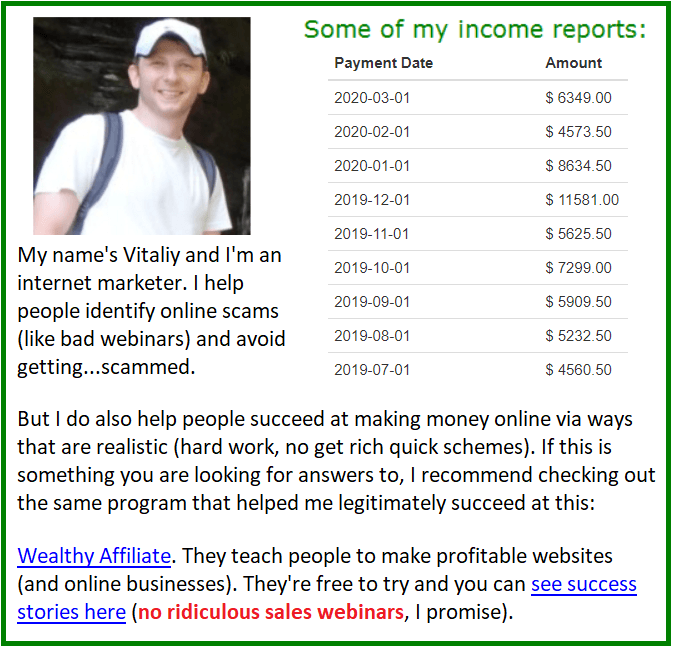
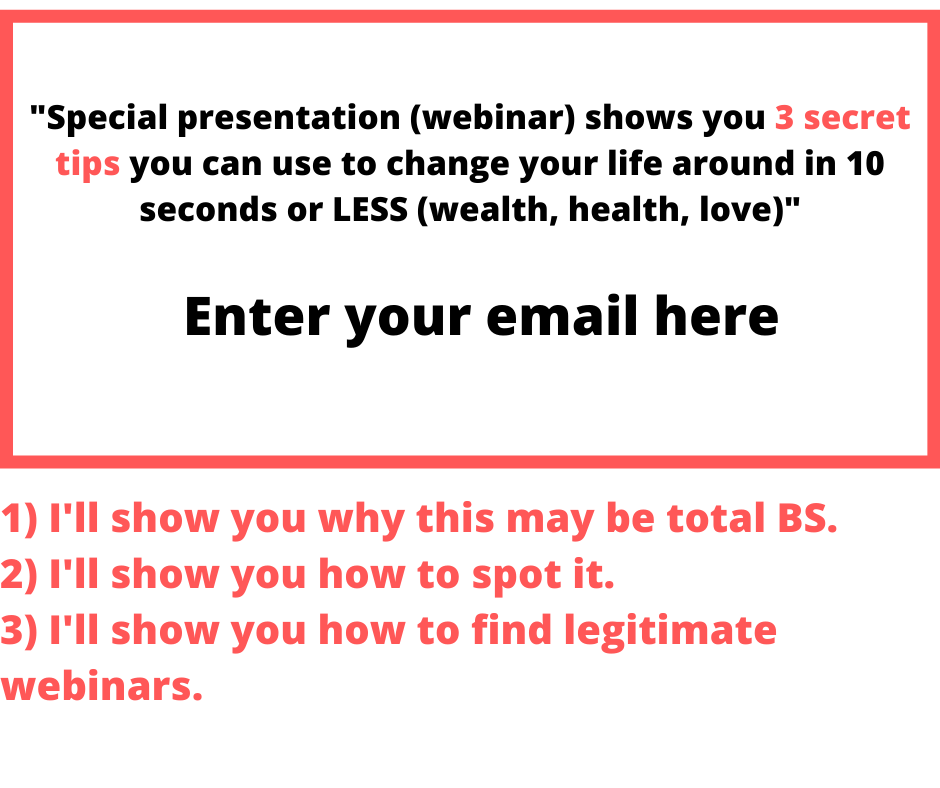
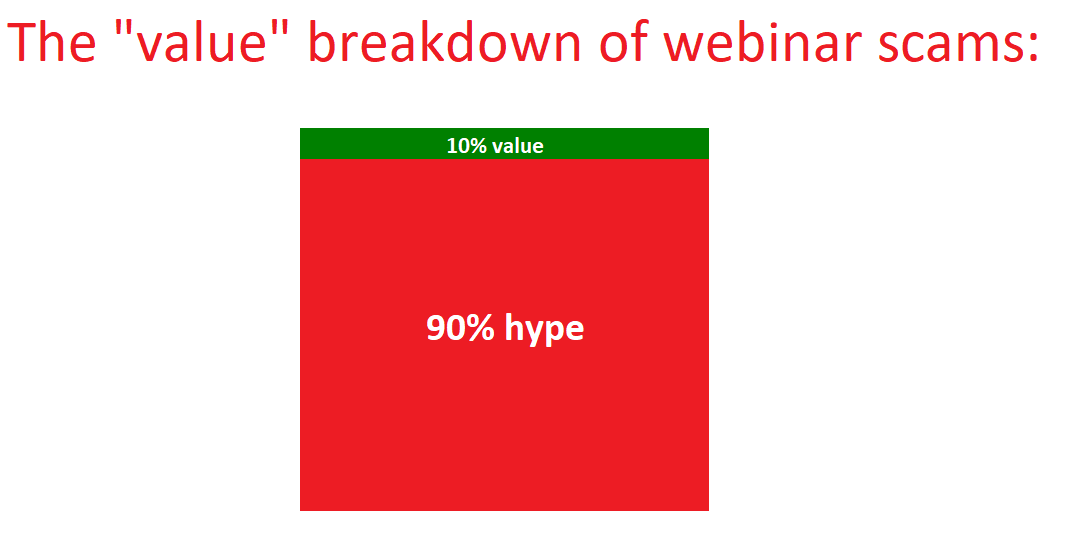
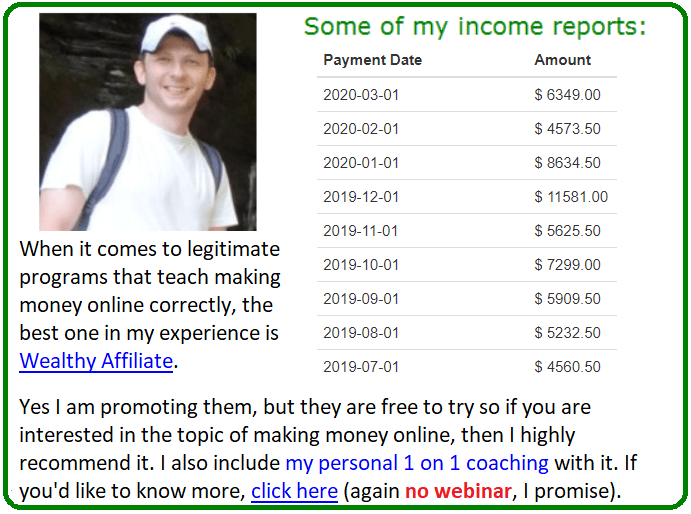
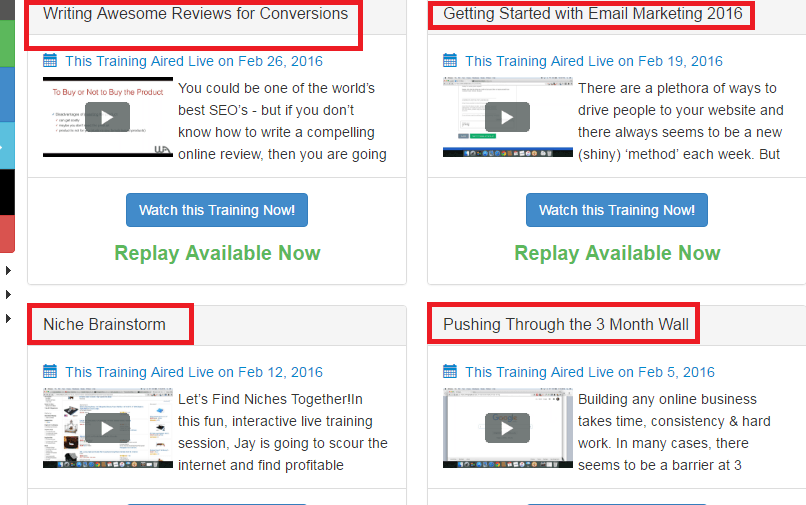
Why is there a sales pitch at the end of this, showing you how to make money online, that is free with no hidden costs? Anyone click on the link. I’ll wait and see if anyone tells me this is legit.
Hi AJ, you’re welcome to check out the page where I talk about the program and I totally get why you’d think it’s a bit ironic to have an article talk about webinar scams, to lead into a program recommendation, but all the things I indicated that people should avoid in webinars is not present with this program and you’re more than welcome to read the 100’s of unbiased comments on the program here to see if it’s legit.
This is an interesting article I’m just curious why it’s dated for 2019 but these comments go as far back as 2016.
Hi J, I originally created it in 2016, and then updated some content on it, and when this happened, I updated the date as well.
It is just UNREAL how even Facebook has become over saturated with these clowns. Their endless promises or gimmicks for revealing how they launched their website or e-commerce business or email campaign that allegedly generated 1-zillion dollars overnight. All gynormous smoke screens for their ridiculously overpriced workshops or sales packages. I almost LOL whenever any of them actually calls me, per the required telephone follow-up or “pre-screening” mumbo jumbo. Just to give them the deer-in-the-headlights letdown that I’m broke and can’t afford their $6k training course.
Yeah you pretty much summarized how these scams operate too Leanette! Personally, I never give them my real phone number because I know even if I don’t turn into a good lead for them, it may be likely they’ll try to sell that email via a solo ad or to other companies/people for a price. Therefore, I never give out my real number.
Either way though, I do tell people to watch out for particular “symptoms” in these webinars and identify if they are scams. I do also tell them about Wealthy Affiliate as being one of the most legitimate places in this industry and at least their webinars are of actual value and not a fishing rod for leads.
I thought I was the only one that noticed this. It is so disappointing. I don’t think most of these webinars are live, although they claim it is. I have stopped wasting my time on some of these, because as you mentioned, they gives nothing of value, but in the end hit you with the ridiculous price point. Thanks for the post.
Exactly, they are, most of the time, recordings Kay and you have also seen through these webinars like I have, good to see we agree on this!
Its hilarious when the “online webinars” actually have a notification on your phone that allow you to pause the video.
It’s not just on the phone, it’s also if you view it on a laptop/computer. I also notice a lot of these places also have fake visitor counts and the illusion that you can participate in the chat, when in fact, you can’t.
I like how this is about webinar scams rather than legitimate webinars. Everyone talks about something that is good and that works, but not enough people talk about what does not work. I can also really relate to this. When I have searched ways on how to make money online, I have seen some of those videos telling you how you can make so much money, but not tell you squat on how to do so. I really like how you show how to also spot good and bad webinars. Overall, this is some quality content!
Hi David, thank you, I’d like to add that often the bad webinars actually do point to things that don’t work, on a topic like making money online, and this is done to further funnel the mindset of the people listening that the person delivering the webinar is the only legitimate option.
It’s a very clever trick, but I do believe most of the people who do provide bad information in webinars or even scams often times don’t even think they are doing that.
Hundred per cent right. These webinars are similar to the expensive offline training offered for the property business and wealth creation schemes of previous decades. Certainly I’ve found WA to be one of the best training sites around. No scams so far. I’m completely happy I’m getting value for money and I’ve learnt a lot.
Oh man, it really makes me laugh when these guys hype it up and don’t deliver. One thing I’ve realized is if the product is good quality there is no need to sell it. The features will sell itself.
And the timing for this post is perfect because mid way through reading I got a call from supposedly my bank offering me a new credit card. That should never happen!
This article is so true, as so many people fall for these scams and unfortunately I have been one of those people. I signed up for a webinar where the presenter made me so hooked, that I bought his program straight away but didn’t get much out of it at he end. I felt cheated and angry at myself for believing him and the fact that I have wasted money that I could use in a much better way. As there was no refund guarantee, I was stuck with the product that was way too expensive for what it was and I have learned a big expensive lesson out of this experience. Your article will help many people to recognize what is good deal and what to stay away from. I only wish I had read this few month ago. Thank you and keep on providing great value to people.
Nicely done. I’m a very lucky girl because I think I got my “scam” education early on and not at my expense. I went to one of the real estate seminars you talked about, (They were everywhere in the early 90s) with a boyfriend. The host was an extraordinary motivational speaker, I will give him that, but he didn’t say anything. He would also get a little aggressive if someone didn’t seem to be “into it”. Like if you weren’t, you had no ambition and would never succeed.
Well when the host finally wrapped up his pitch, I was ready to go and start ranting about learning nothing when to my shock almost the whole room including my boyfriend, gets up and literally runs to the back of the room to the purchase area they had set up back there.
I think my mouth was hanging open a bit. When I looked over at the host he was surrounded by people clamoring for his attention. He by chance happened to turn a glance at me and he had the strangest look of satisfaction like he was mentally doing a dollar count and didn’t care if I saw it at that point.
Well my friend never accomplished anything with the course and when I read through it I could see why. Now almost everything webinar, seminar, whatever that I run into is almost a replay of that day.
So yeah you pretty much nailed it. Thanks for your insight.
Bri
Awesome Vitaliy, I have taken down some notes so that I am aware of the format of how these webinar scams run and their general way of being turned into a sales event rather than an informative educational event.
It is like they have an ulterior motive for you to attend (to sell you something!)
Hi Vitaliy
I see you have significant experience with online business and I think it is really great you share this experience with others. Personally, I haven’t participated a lot of webinars, just few ones and these, as you mention, were more like sales pages so I lost trust in this way of learning. What I don’t like about webinars is that you have to watch them to understand if it is a scam or not so at the end it means wasted time in case it is a scam.
Yes, I suppose webinars are like the online version of these scammy conferences that people attend. They go along to the conference hoping to get some valuable information about how to be successful, and then they end up being given a sales pitch to buy a product.
But I wonder how different this really is to those of us who write articles for a website and then use that as an opportunity to funnel people towards a particular offer. People arrive at our websites looking for valuable free information. Sure, we give them that, just as you have here, but our real reason for doing it all is to make money.
What do you think?
This is a very good question Marcus and there are a lot of writers who do indeed do the same exact type of thing as scam webinar do, but what I have found is that people who write genuine reviews and give plenty of information about the said topic and THEN funnel to another program generally get higher conversions.
I would treat articles that follow the same pattern as bad webinars in that if they don’t give you an answer to a question early on, then you should leave the site.
I also find that in webinars people don’t know what to expect when they watch other than what they were originally promised. When people visit articles, it is generally because they have a specific topic in mind they want to know about which makes it harder to keep their attention if the writer instead of speaking about the topic steers to the sales pitch.